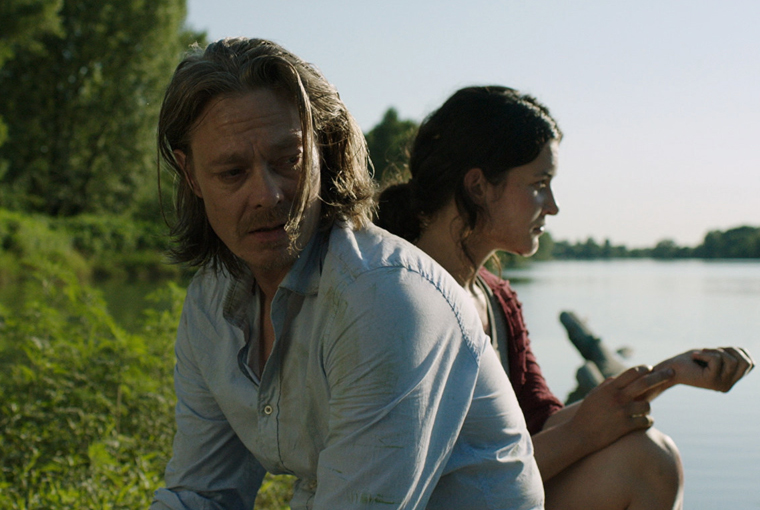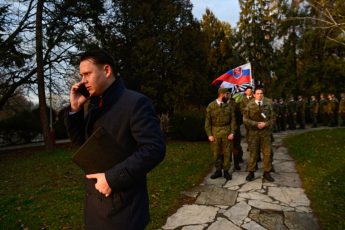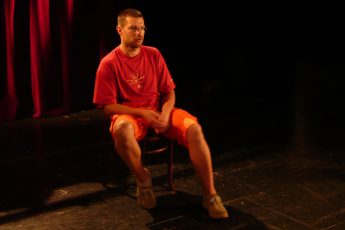Isolated from the World and Viewer
Sonja Prosenc’s History of Love (Zgodovina ljubezni, 2018)
Vol. 86 (Summer 2018) by Colette de Castro
Sonja Prosenc is presenting History of Love at Karlovy Vary, her second feature to premier at the film festival following The Tree (2014). The protagonist is named Iva (played by Doroteja Nadrah), and she recently lost her mother under mysterious circumstances. The deceased has left some hints to her past life: three children and a husband, a lover in the form of a Norwegian orchestra conductor, and a long, red cardigan. There is also a package which arrives at the gate of her house near the beginning of the film. The package is left unexplained throughout the film but its appearance is shown to be upsetting for her children and husband. It’s an aggravating MacGuffin (incidentally Hitchcock popularized the term MacGuffin during a Columbia University lecture with the very example of an unexplained package). As a way to explain the disappearance of the mother, the delivery of the package is overplayed – after the postman asks for a third time when she will be coming back and the daughter looks enigmatic and sad, we really do get the point. But rehashing the mother’s untimely death is ultimately what this film is about, and though we do wish to give this Slovenian director’s second film a second chance, the fact that our suspension of disbelief is already troubled so early on in the film is probably not a good sign.
Iva has a sister and a brother. The brother of the protagonist is around her age, protecting and watchful, and the sister is a daughter who seems to only exist in the film to raise the cuteness ratio, wandering around delicately with long hair and a wistful look in her big brown eyes. The husband has no speaking lines, but he does make an impressive bonfire at the end of the film which contrasts with all the swimming the children do. The daughter spends the whole first half of the film doggishly stalking the lover, breaking and entering into his house and finding a trace of her mother there in the form of the aforementioned cardigan.
Prosenc’s previous film, The Tree, successfully brought to life a dream-like situation which carried us with it, successfully mixing time and space in a way that carried our imaginations along. Life is linear, but our thoughts are not necessarily so. Especially at intensely emotional times of life, such as following the loss of a loved one, we tend to live outside of the present, with flashbacks and hopes for the future constantly interrupting the steady time flow. The Tree portrayed these emotions and histories successfully, whereas the confusingly titled History of Love fails to do the same thing. Perhaps we can consider some of the reasons this was unsuccessful.
In her previous feature, the characters were completely isolated from the rest of the town and we focused solely on them. Here there seemed to be a similar intention, as every time Iva meets a stranger their face is either blurred or obstructed by a window or an object (an effect orchestrated by DoP Mitja Ličen). But this is not carried out consistently throughout the film, as sometimes we will suddenly see a large group in focus, and then be brought back into the world with the appearance of a crowd. In addition, while she tries to create a space in which we witness events from Iva’s perspective, the gaze will suddenly switch to that of the brother or the lover and then we’ll be jolted out of any rapport we had started to create with the character.
In the first few scenes we are introduced to Iva at the swimming pool. Her friend speaks to her but we hear little – Iva does not have her hearing aid with her, so we, too, hear just a blurry buzz. We see her putting it back in and the sound suddenly comes to life, allowing us to enter her private universe. But later on the effect is not repeated, which bars us once again from empathizing with the character. This overall lack of consistency is at best frustrating and at worst isolating for the viewer, who tries to but cannot sympathize with a character whose life seems linear, though not entirely.
There is something poignantly sad about watching the disappointing second film of a director whose first film you loved. Perhaps the unfinished aspect of the film comes from a rush to finish it on time, or the pressure of making a second film after the first film’s success. In any case, her ambitions to portray the internal story of a grieving teenager seem to have gone astray.
Prosenc does however bring warmth and talent to the screen in moments which portray the intimate vulnerability of girlhood: Iva changing apprehensively out of her swimming suit under her clothes after she’s been at the pool; the way she watches out for her younger sister, whose potential to be harmed seems infinite after she breaks a glass object. She captures the anxiety of adolescence and shows the protection instinct that sisterhood entails, with a forthright female gaze. Prosenc’s ambitions to create a multi-sensorial work of art are certainly dignified, but if only she would take a step back and allow her vision to follow through calmly without trying to cram in so many thoughts and concepts, we might be able to hear her voice once again.




Leave a Comment